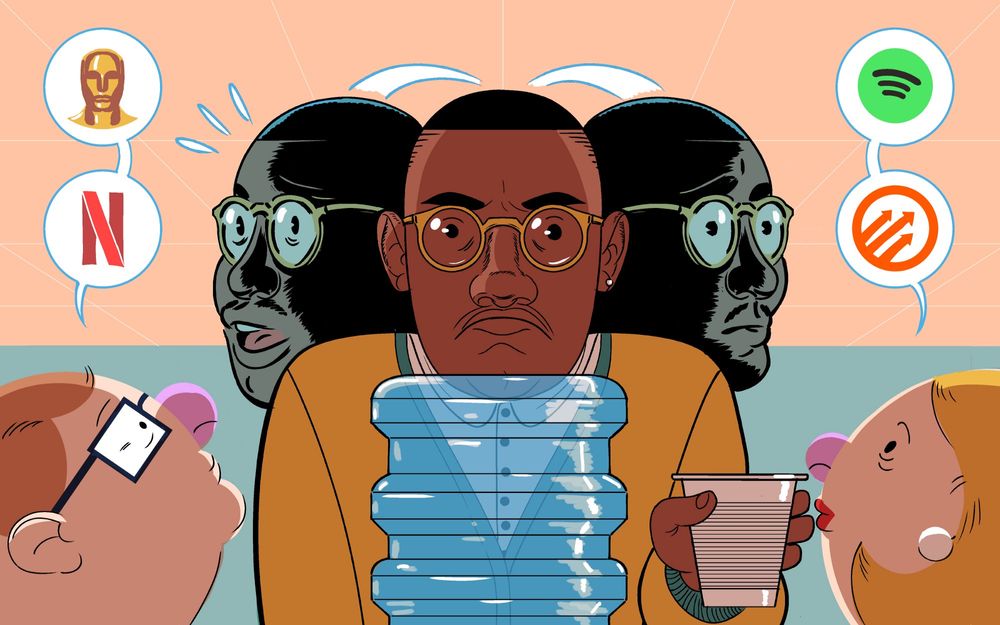Illustration: Michael Kennedy
I still remember the moment Solange’s A Seat at the Table dropped in 2016. The project exemplified #BlackAF long before Kenya Barris co-opted the term, a sonic response to turbulence and trauma in Black America that offered uplift, joy, and empathy. The picturesque music videos, spoken interludes by Master P, and lyrics about the importance of self-care all became unifying moments; Black Twitter was lit, and so was I.
After jamming to Beyoncé’s soulful younger sister that entire weekend, I stepped into the office the following Monday with shea butter glazed on my skin and “Don’t Touch My Hair” blasting in my headphones — a force field of Blackness invisible to the untrained eye and impenetrable by the microaggressions of my co-workers. Me and my high-top fade felt untouchable. Until I sat at my desk, ready to get the day started, and felt a tap on my shoulder.
It was Lindsey, a chipper White woman with a high-pitched voice who worked in accounts payable. I got the feeling she was waiting for me to arrive, based on the swiftness with which she approached. She seemed even more charged up than usual this particular morning. I swiveled around to see what the hell she wanted at 9:15 a.m.
“Oh my God, have you heard Solange’s new album?” she asked. “It is sooo good! I literally cannot stop playing it!”
Now, aside from being forced into a non-work conversation before I’ve had a chance to fill my coffee mug, there wasn’t anything explicitly wrong with this exchange. Solange is a popular artist, and she released a great album that anyone was free to enjoy. But there was a lyric from “F.U.B.U.,” a Black-ass song on A Seat at the Table, that stuck in my mind as I feigned shared elation with my redheaded co-worker: “For us. This shit is for us.” As in: us Black folks. As in: not you, Lindsey.
I’m all for sharing. But in America, Whiteness is the standard in both corporate offices and pop culture (see: U2, Friends, anything with vampires that’s not Blade). My co-workers continually see themselves in art; it’s their experiences being reconstructed, their perspectives being validated. It just feels like there’s much less that’s tailored to Black people. And sometimes we just want some shit for ourselves — without interference from the White gaze.
My co-workers continually see themselves in art; it’s their experiences being reconstructed, their perspectives being validated. There’s much less that’s tailored to Black people. And sometimes we just want some shit for ourselves — without interference from the White gaze.
These types of interactions play out in different ways. When Hidden Figures hit theaters, I found myself in a discussion with another co-worker who was gushing over the historical drama about the Black women who worked at NASA and were pivotal in the space race. He didn’t expect me to be underwhelmed. Sure, I love Janelle Monáe, Octavia Spencer, and Taraji P. Henson, all of whom played their roles to a tee. But it takes a bit more energy than I’m willing to exert to explain the White savior trope and why that would bug the shit out of me while watching the film. We just have different perspectives. I’ll reserve that convo for someone with a similar frame of reference.
(Also, I don’t even know if these people really enjoy these works of art or if they’re trying to score some progressive points. Like the Obama supporters who go out of their way to let you know their political allegiance. No question that someone is free to dislike Kendrick Lamar’s incendiary album To Pimp a Butterfly — but if that critic is White, I may have some other assumptions.)
I’ll make my efforts to stay up on the flavor of the month on television, whether it’s Tiger King or 90 Day Fiancé, just to be in the know and able to kick in my two cents if asked. I can reference episodes from every season of The Office, especially gags that involve my on-screen counterpart, Stanley. But when it comes to work that’s explicitly and emphatically Black (like Beyoncé’s Black Is King or the thrilling new HBO period piece Lovecraft Country), I’ve found that it’s more comfortable to steer clear of those conversations with those who’ve got the complexion for protection. Especially when said art delves into racial issues that play out in real life after the beat stops or the credits roll.
That’s not to say I don’t want my co-workers to consume these works. There’s probably a lot they could learn about me from a binge of Insecure. Or, yes, a playback of Solange’s A Seat at the Table. Like, for instance: Don’t touch my hair.

Comments
Leave a comment